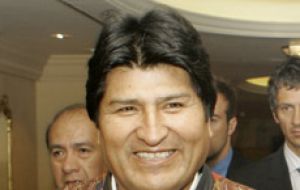MercoPress. South Atlantic News Agency
Morales says “referendum failed” but calls for dialogue
 Pte. Morales is too radical for Sta. Cruz voters
Pte. Morales is too radical for Sta. Cruz voters The richest region of Bolivia, Santa Cruz voted overwhelmingly for autonomy on Sunday in a vote widely seen as a rejection of President Evo Morales' radical reforms. However President Morales said the referendum “had failed categorically” because less than 50% had voted and called all governors to build a “true autonomy”.
The vote was the first of four referendums on greater autonomy from central government being planned by Bolivia's eastern and richest lowland provinces, deepening a divide between Morales' supporters and the conservative opposition. According to the pollster Focaliza cited by local television, Santa Cruz residents voted over 80% in favor of autonomy and 14% against. The result had been widely expected in spite of the polls boycott from Morales supporters. However abstention was estimated in the high thirties. "Unfortunately today's events have divided Santa Cruz, it has made families living there to clash", said President Morales in a message on national television from La Paz at the end of the voting. He said he was very sorry about the "fighting between brothers", between pro and anti referendum but praised the "rebellion" of those who resisted the "illegal and unconstitutional statute". However he called on all governors to "begin working as of tomorrow on a true autonomy that respects the constitution". Morales pointed out that if abstention, annulled and blank votes are added "they practically sum 50%" and any statute must "be ratified by 50% of votes plus one". But on the streets of Santa Cruz city, residents honked car horns as they celebrated victory in a referendum that Morales had branded as "illegal and unconstitutional". Voting was mainly calm, but officials said at least 20 people were hurt as supporters and opponents of Morales fought with sticks and stones in the region's capital. It was later reported that one man died as police fired tear gas to quell the unrest. Early Sunday morning Morales supporters set up road blocks isolating Santa Cruz city from the rest of the region. The referendum theoretically gives Santa Cruz's conservative leaders more control over natural resources that include fertile farmland and Bolivia's oil and natural gas reserves. Santa Cruz governor Ruben Costas and the main opponent of President Morales described the event as "historic and a benchmark for the new Bolivia". "The referendum is a democratic celebration", said Costas who also accused Morales of sending thugs to Santa Cruz to provoke, generate violence and try to prevent the vote. Nevertheless "this is a resounding victory" but also a "message of peace, democracy and freedom that we dedicate to all the peoples of Bolivia" said Carlos Dadoub, head of the Autonomy Department from Santa Cruz. "From now the government has no other alternative but to reach a concertation with all regions", he underlined. Bolivian political analysts agree that despite Morales' rejection of the validity of the ballot, the resounding "yes" vote could force him to negotiate with his opponents in Santa Cruz and three other pro-autonomy regions in Bolivia's eastern lowlands The growing demands for regional autonomy have exposed a bitter divide between Bolivia's wealthier lowlands and the poor Andean highlands, where tens of thousands of people marched to show support for Morales -- Bolivia's first indigenous president -- in several cities. Political tensions have heightened in recent weeks in South America's poorest country and Bolivia's armed forces issued a rare statement on Saturday that backed the president and called the referendum a threat to national security




Top Comments
Disclaimer & comment rulesCommenting for this story is now closed.
If you have a Facebook account, become a fan and comment on our Facebook Page!